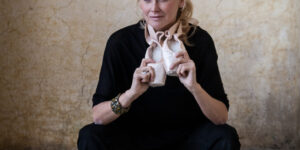27 March 2017
A new musical has enriched the repertoire of our theatre Kiss me, Kate. Its director Kateřina Dušková invited choreographer and dancer ALENA PEŠKOVA, who had already worked with our ensemble in the realization of the drama performance Don Juan, but there were far fewer dance or movement numbers. And so I was not even "warned" by the information that Alena is the head of ballet at the F. X. Šalda Ballet in Liberec. I just didn't make the connection, and so I was surprised by several things right at the beginning of the preparation of the production - the choreographer not only listened to the music, but also required sheet music, i.e. a piano excerpt, to prepare individual numbers, she named the dance steps or movements with French names, and the demands she had on the dancers were unusual. Gradually it dawned on me: she looks like a fairy, she is beautiful, slender, gentle and patient, but underneath that is an absolutely uncompromising choreographer with high demands she places on herself above all. Yet, or maybe that's why everyone was so excited about her! When I thought about the questions for our interview, I was probably most interested in how she found working with us and what experience she takes away...
Alena, what is your experience with musicals in drama theatres? Or working with drama actors in general?
Yes, I do have experience, although my main field is of course ballet and dance theatre, where I work with professionals trained to do so. However, I also "branch out" into opera, drama and musical theatre. And experience is like everything we have been given - it serves only if you know how to work with it, otherwise it can be a great burden. I always try to approach new assignments and new people in a new way. Although, as I say - but I may have "stolen" this idea from Kundera - "the degree of the ability to forget and imagine is the same in an individual". So, for example, I can't shake the impression that the tenors in an opera chorus are the hardest to "work out" choreographically. (laughs) So the actors are still pretty OK. Of course, it's individual, it depends on attitude and will. If you want to, anything goes.
Most of our dancers are not professionals in the field. I'm sure it took you a while to figure out their capabilities, but it seems to me that you ended up getting along pretty well. How would you rate your work together?
I must admit that at first I was a little scared. I imagined - and here we go again - a slightly younger "company". And me being the dancing grandmother that she's implying. I don't want to be a fan, but maybe we're peers. (laughs) Fortunately, I soon understood what their strengths are - they are experiences - and here we go again. Once they started moving, I was relieved and now I'm downright happy. They "catch" my movements very quickly, they control the "partner" and they come to rehearsals prepared. Few teenagers would be so convincing and look so fresh. The audience has a lot to look forward to.
Were you satisfied with the movement level of our actors? Did you find it difficult to get them moving or was it easy?
Again, this is all very individual. But despite my experience in this regard, it always surprises me again how actors and singers are used to expressing their "opinion" before the choreographer has explained his idea to them. That doesn't really exist in ballet. But that's my fault, of course. This is a musical and there are more of those "ingredients". Someone sings brilliantly, someone "finishes it", someone is strong just in dancing. Of course, the ideal is to have it all together, but there aren't that many Travoltas. I usually calm down after the first rehearsal and concentrate on what suits who, and then I also very much respect the word of the director - in this case Katka, who, I think, is very good at judging when to push the envelope and when to let go. It's the same here with the Pardubice actors, I offer, but I also let myself be offered. I think there's something on both sides, and I hope the audience will appreciate it.
Kiss me, Kate is a musical with great swing music. Is it the music of your heart?
Yes, it is. It's still a real musical. Imagine I was still dancing in it myself. In Pilsen, choreographed by Honza Crha... Yes, I think it's last century. (laughs)
The musical is about the rehearsal of a theatrical performance, so it's theatre on theatre. Composer Cole Porter uses a slightly different musical language in the songs that accompany the drama and in the scenes of the Renaissance play The Taming of the Shrew that the company rehearses. So will there be any differences in the dancing?
Theater on theater, alienation, that's my world. I've done Langer's Periphery, Lorca's Blood Wedding, Jessie and Morgiana, Gazda's Robe and others in this way... and it's actually my life's conviction. Just like in life - I'm the actor here and it's necessary to play to the fullest, but I mustn't forget that I can also be the director, who can change anything at any time, or stop the whole play, light up the "work"... The joke is that if you play the role really fully, the director loses the need to interfere in any way.
You've danced big roles in classical ballet and you're also active in an Ultra-minimal-ballet company, which is probably a completely different genre. What kind of dance interests you the most?
I'm most taken with big dramas done as raw dance theatre. But I grew up on the "classics", so I often use it, even abuse it. (laughs)
Which role that you danced has enriched you the most?
It wasn't just roles, there was a lot of beautiful dancing in purely abstract choreography. Of the roles, probably the Lady with the Camellias, Morgiana, Lady Macbeth and the comic Pamina...
Has it ever happened to you that you choreographed a ballet you danced in before?
I think it was Titania, which I danced at the State Opera, A Midsummer Night's Dream I staged in Ústí nad Labem, I don't remember any more... And now actually Kiss me, Kate. (laughs)
I don't know why, but the dancers I've met, I mean members of the ballet, have always tended towards either classical or expressive modern dance. Is it just my distorted idea, or does it work in a similar way?
I don't really like this "spoiling" thing. And it's not played much these days. Any professional dancer in a stone theater has to be able to do both. To me, art is not classical and modern - it's either good or bad. And what is modern? What's classical tomorrow? Or what's old this afternoon? Bach's children used to call him (or is that just a rumour?): Daddy, this kind of polyphony is already a bit "demodé". Ha, and only Bach showed us what "this kind of polyphony" still has enormous possibilities - to shoot you up to orbit. Classical music is only dead when we bury it or put it in a museum. Classical music is again an experience to be worked with... preferably in a modern way. (laughs)
When I see how the choreography is built, I am always surprised how the dancers remember the steps and movements. Does movement memory work like memory for lyrics? Do you even take notes?
I do take notes, but only as a choreographer, because I don't rehearse everything to the fullest, so I don't have much of a memory. I call it muscle memory, and it works great. But it works more in the subconscious than in the conscious mind - unlike memory for words. When you write it down in your muscles, you don't have to think about it anymore, your muscles are automatic. But you have to write it down honestly. The muscles also remember the pace at which they worked. A case in point: I once danced at a project at the Roxy with a modern band. I had the choreography rehearsed on a recording and the agreement was that the tempo would be the same. At the rehearsal I protested against the slower tempo. Everybody laughed at me that I was dreaming because the drummer had a click in his ear, and it was "precise"... I was grumbling because I could feel it in my body, although it seemed OK to me. The drummer then came to apologize to me - he had changed his clicker.
How does a dancer become a choreographer? What was your journey to creating your own dance creations?
I felt this need already at the conservatory. Already at our graduation performance at the Estates Theatre my classmates danced in my choreography. I don't know how other colleagues feel, but I just couldn't and can't help it.
Do you go to the theatre as a spectator? What has caught your attention lately? It doesn't matter if it's ballet or drama...
The dance theatre Lešanské Jesličky by choreographer Lenka Wagnerová, Shostakovich's opera Antiformalist Fair performed on the New Stage of the National Theatre - it is superbly staged, and I am fascinated by the background of its creation. Unfortunately, nothing from the drama has impressed me significantly in recent times - but I haven't seen everything I would have liked to and should have.
Being a ballet dancer is probably a lot of hard work, I'm sure it involves a lot of sacrifice. What's your biggest regret that you had to give up? Like sports or anything like that...
I'm certainly not sorry about the sport. (laughs) I have no sportsmanship at all. And I haven't yet grasped the philosophy of sport. Personally, I don't understand what's so great about jumping an inch further than your teammate. I don't like ballet competitions for the same reason. Of course, outdoing yourself is something else. So it's not the sport. It's more like I haven't caught up with some things yet - I still need to learn to cook and drive a car, for example. (laughs) But I think my profession has given me much more. I've seen a lot of the world and I constantly meet people who are very inspiring.
You are currently working as the head of the DFXŠ ballet in Liberec. What is the level of the ballet company there? What are you preparing this year on home soil?
Of course we are world class. (laughs) No, seriously, we're the smallest stone theatre company in the country. So everything here is specific. Everyone's a soloist. We're really world class in terms of the cast of the company - we have Japan, Australia, Britain, France, Russia and the Czech Republic represented. Librettos are specially adapted, original music is written for us. We do original theatre, and I enjoy all of that. The nearest premiere will be Petrol Lamps, which will be specially prepared for us by Libor Vaculík, then I will work on (S)creation - it will be my first full-length Sunday ballet - it is subtitled Musical-Dance Ritual and will be based on the five principles of Taoist philosophy. And we'll have a live performance by the drumming group Aries.
Do you have any unfulfilled theatre or dance dreams?
Theatrical, not so much. I'm very lucky in that regard. Outside of Liberec I can choose my work and in Liberec I can do my own dramaturgy, which is great. But there is one thing, and that is the combination of film and dance. There are of course many dance films, but I have something in my head that I haven't seen anywhere before, and I'm very interested to see if it will work. I mean, combining dance technique with film technique. Of course I wouldn't trust anyone else to direct, and that's a problem, so now I have to find the energy and time to convince someone to give me the trust and the money. (laughs)
Alena, I wish you an enlightened benefactor for all your planned projects and may the hope, focus and professionalism with which you throw yourself into every work last for a long time.
Jana Uherová




Comments are closed.